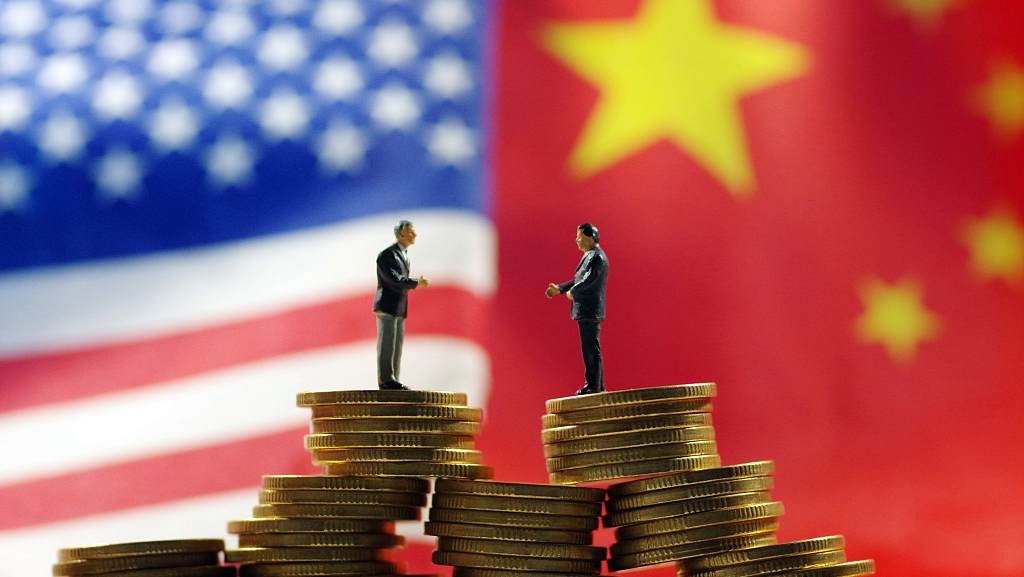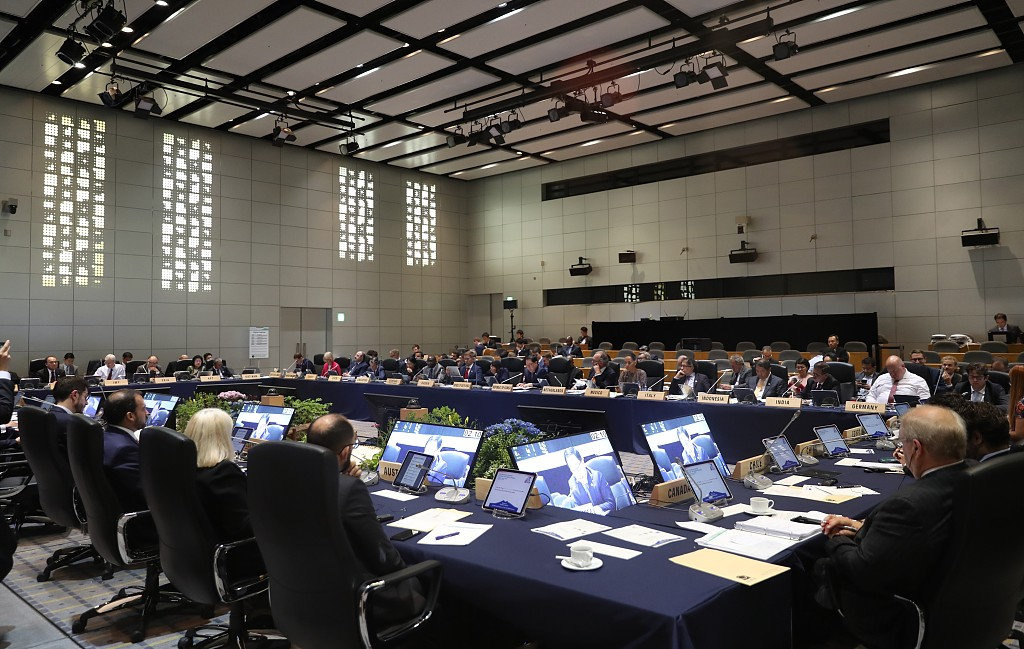

Editor's note: Bobby Naderi is a journalist, current affairs commentator, documentary filmmaker and member of the Writers Guild of Great Britain. The article reflects the author's opinion and not necessarily the views of CGTN.
This is an absurd real-world version of a fairy tale, and it could change the contours of the global economy.
After pressuring financial markets and damaging the world economy for more than a year with a costly trade war, President Donald Trump tweeted on Tuesday that he spoke with Chinese President Xi Jinping on the phone, and the two leaders agreed to have an extended meeting at the G20 summit in Japan from June 28 to 29.
Seeing past his ego for the first time, Trump said, "Had a very good telephone conversation with President Xi of China. We will be having an extended meeting next week at the G20 in Japan. Our respective teams will begin talks prior to our meeting."
This is a study in contrasts as Washington's leadership fades more quickly than anyone could have imagined. It is happening on a Trumpian planet in which the "tariff man" waged trade wars on other surplus economies as well and threatened to impose tariffs if others didn't prompt concessions. China, of course, didn't although Trump insists it will eventually meet his populist demands and geopolitical ambitions. Far from it, Beijing defied his threats and retaliated by imposing higher tariffs on American goods.

The G20 Ministerial Meeting on Trade and Digital Economy at the Tsukuba International Conference Center in the Ibaraki Prefecture in Japan on June 9, 2019. /VCG Photo
As a consequence, U.S. businesses, consumers and agriculture companies, particularly soybean farmers, are mourning. They complain that because of the retaliatory measures, they have seen vital Chinese purchases of their products plummet. They see this is not about the previously "exceptional" and "indispensable" country that Trump swears he will make "great again." This is about Trump's political miscalculation, his failed gambit to offset their lost revenue, particularly from states that will be key to his reelection in 2020.
It is this kind of desperation that made the "tariff man" do surprising things. On June 18, Trump realized his much-publicized trade war has had unintended consequences for the U.S. economy. Instead of hobbling China's future growth or diminishing its power, the failed trade war ended up disrupting financial markets, businesses and agricultural systems. It caused a disastrous outcome for consumers who ended up paying for his political gambit in the form of sales tax and higher prices.
However, the landscape of their world of uncertainty might have changed already. In the news, U.S. stocks jumped several hundred points immediately after Chinese media quoted President Xi as saying he is also looking forward to the meeting.
President Xi said, "As the two largest economies in the world, China and the U.S. should play a leading role in promoting positive outcomes of the Osaka summit of the G20 and injecting confidence and vitality into the global market. I would like to meet with Mr. President during the summit to exchange views on fundamental issues related to the development of Sino-U.S. relations."
In this era of growing great-power struggle and competition, this has to be a huge relief after a year of global financial turmoil and economic hardship for all sides. Last month, the flare-up in trade tensions wiped more than 1 trillion U.S. dollars from global stock market values on May 13. As a consequence, Washington's dominance over the world economy has withered, and its once-superior businesses are losing their competitive edge. This forced over 600 companies to send Trump a letter urging him to call it quits and stop advocating his version of economic nationalism.

Jamie Ballenger takes a sample of soybeans to test the quality as they are loaded into a shipping container at a Ruff Bros. Grain elevator in Blackstone, Illinois, in the U.S. on June 13, 2018, /VCG Photo.
Their letter betrays the reality of Trump's ambitious claims and failed trade war all too clearly, and it is under such a scenario that he is now willing to meet with Xi. Among other things, China is still ready to purchase more U.S. goods in any new trade talks. But it wouldn't make an unfair deal because of the economic damage Trump's tariffs are inflicting on the U.S. economy.
Many Republicans and Democrats whether from the left, center, or right, are also attacking Trump for using tariffs as a way to push China to change course, arguing that he is effectively creating new taxes on U.S. businesses and consumers.
Adding extra pressure to the mix, many more businesses are now asking Trump not to expand his tariffs to 300 billion U.S. dollars' worth of Chinese imports. They warn this would drive up prices for consumers, squeeze profits and leave U.S. companies at a competitive disadvantage. They say this, plus the global nature of the conflict, would threaten aggregate demand and consumption growth and would reduce disposable income, capital spending and investment.
The leaders on both sides have an incentive to avoid such an outcome by finding a compromise at the G20 summit in Osaka. There can be parity between the two super economic powers, and they should end the trade and technology war. The alternative is to ratchet up nationalistic rhetoric, pursue tit-for-tat measures, de-globalize and close their markets, disrupt global supply chains for multinationals like Apple and Huawei, and eventually, slow global growth.
Seeing the future and reading the tea leaves, the world's two largest economies should avoid a long war of attrition in an already fragile global economy.
(If you want to contribute and have specific expertise, please contact us at opinions@cgtn.com.)

Copyright © 2018 CGTN. Beijing ICP prepared NO.16065310-3
Copyright © 2018 CGTN. Beijing ICP prepared NO.16065310-3